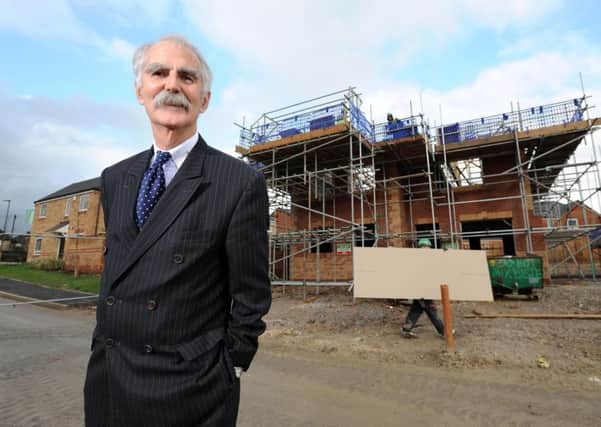Helping council tenants on to property ladder


His passion for the job shines through.
“I was doing a key handover with a chap in Barnsley,” he tells me.
“The buyer was a single parent, aged 35 with a 10-year-old son. When I gave him his keys he said to me: ‘My dad had two ambitions: to own his own home and that his son – that’s me – wouldn’t go down the pit. My dad didn’t buy his own home, but I wish he could see me now.
Advertisement
Hide AdAdvertisement
Hide Ad‘Before I bought a house from you, my life was mapped out. At 65 I’d go on housing benefit, have my pension, I’d die and leave behind a wardrobe full of old clothes.
‘Now I know when I get to 65 I’ll own my own house. I won’t be taking anything from anyone. When I die, I’m going to leave my lad a house’.”
Mr Harrison believes that Gleeson is empowering people, giving them the chance to own their own home after years of being dependent on the council.
The urban regeneration specialist plans to build 1,000 homes a year and it has already made a commitment to building around 400 homes in Yorkshire over the coming year as demand increases for its affordable housing.
Advertisement
Hide AdAdvertisement
Hide AdThe Sheffield-based firm has reported strong demand for its properties and annual revenue shot up 44 per cent after it sold 751 homes in the year to June 30, up from 561 the previous year.
The group focuses on helping council house tenants to buy their first home and, with an average selling price of £123,750, it is making house-buying an affordable goal for many families.
Pre-tax profit almost trebled to £11.3 million in its first half to December 31.
“We are making a significant contribution to the housing market, and to the bottom end of the market,” says Mr Harrison.
Advertisement
Hide AdAdvertisement
Hide Ad“80 per cent of the houses we sell are sold to council house tenants, which means the council houses can be occupied by people with poorer means.
“In places like Sheffield, the council waiting list stands at around 16,000 so every time we sell a house we take someone off the waiting list.”
Gleeson has sites across Yorkshire including Bradford, Leeds, Rotherham, Sheffield and Barnsley. Mr Harrison says that Gleeson’s sites can have a significant effect on the surrounding area, with its home city of Sheffield being a prime example.
“We are building 385 houses and we are lifting the area.
“There are another 300 people there visiting local shops and making sure the schools are full,” he says.
Advertisement
Hide AdAdvertisement
Hide AdGleeson’s buyers are typically in their 40s with grown-up children.
“They’ve got a good work ethic. They’re good, solid, working class people who currently live in a council house and they want to better themselves,” says Mr Harrison.
He says that the group’s developments, which typically offer three-bedroom detached or semi-detached properties, help to bring a sense of pride into areas of industrial decline and social deprivation, and this has a knock-on, beneficial effect on the area.
“If someone is living in a council house and they see someone vandalising the house opposite, they would probably close the curtains,” he says, adding that once people own their own home, they will take action to protect the area and stop the vandal in his tracks.
Advertisement
Hide AdAdvertisement
Hide AdWhen asked which development he is most proud of, he says Toxteth, the Liverpool area infamous for the 1981 riots.
“The development is so multi-cultural. Everyone knows each other. They could be Jamaican, Polish, Pakistani, Nigerian. It’s a big, wide range of people and they all get on. It’s brilliant,” he says,.
Mr Harrison has an impressive track record and this has not gone unnoticed in the City.
Analyst James Tetley, at N+1 Singer, says: “Gleeson has a highly experienced management team, a simple and proven strategy, and a track record of earnings upgrades.
Advertisement
Hide AdAdvertisement
Hide Ad“Jolyon Harrison has had a successful career in housebuilding in the North of England spanning more than 40 years.”
While Mr Harrison is clearly passionate about giving people a chance to own their own home, he’s no soft touch.
After a 40-year career in the housing industry he is candid about falling out with various boards and then moving on.
“I retired in 2006 and got very, very bored. I looked around for something to do and started talking to Gleeson. I was appointed managing director with a view to becoming CEO,” he says.
Advertisement
Hide AdAdvertisement
Hide Ad“Most of the management team were made redundant by me. They were not up to the standard I expected. I waited for my old team to come and join me and they did. It’s been good fun.”
A grammar school boy, he went on to get building qualifications at Chesterfield Technology College.
Gleeson started life in Sheffield in 1904 when Michael Joseph Gleeson became a bricklayer and then married the boss’s daughter.
In the 1920s, Gleeson bought a greyhound stadium and several local cinemas. During the Second World War, Gleeson was instructed by the Government to devote all its efforts to war work – building airfields, military camps and hospitals. It floated in the 1960s and subsequently moved its head office to the South of England – a process it reversed in 2015 when it returned to Sheffield.
Mr Harrison says: “Bringing the registered office back to Sheffield really gives us a feeling of pride, of coming home.
“Gleeson is a big name around here.”